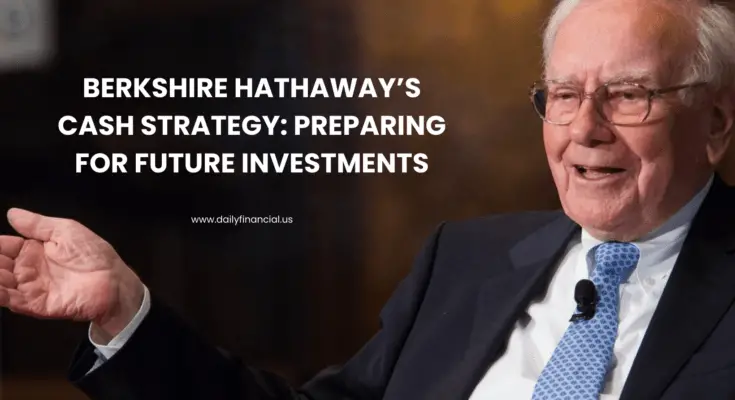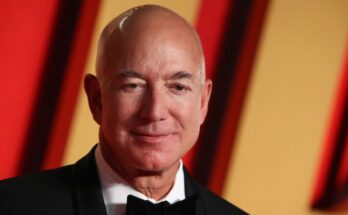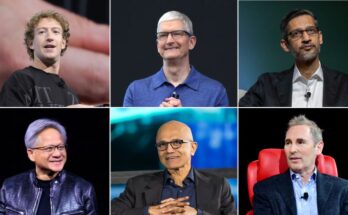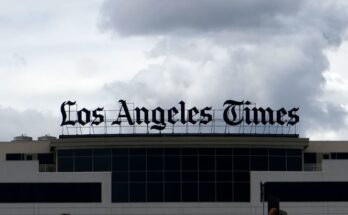Warren Buffett, widely regarded as one of the most successful investors of all time, has always been known for his astute financial strategies and keen insights into market trends. As the chairman and CEO of Berkshire Hathaway, a multinational conglomerate holding company, Buffett’s decisions carry significant weight in the business community. Recently, Berkshire Hathaway’s decision to increase its cash reserves to a staggering $227 billion has triggered discussions and concerns about the broader implications for the U.S. economy.
The Context of Increased Cash Reserves
Berkshire Hathaway’s massive cash reserves speak volumes about both the company’s operational strategies and the prevailing economic climate. Cash reserves are generally viewed as a buffer against market volatility, providing flexibility for investment opportunities, acquisitions, and managing day-to-day operations without the immediate pressure of cash flow constraints. However, an increase in cash reserves can suggest that a company may foresee economic uncertainty ahead, which leads to a cautious approach towards investments.
Buffett has a history of navigating through economic cycles with a keen sense of timing. His philosophy emphasizes understanding the intrinsic value of investments and holding onto them for the long term. The current increase in cash reserves signals that even seasoned investors like Buffett are bracing themselves for potential challenges within the marketplace.
Here are some key points to consider:
- Market Confidence: Berkshire’s substantial cash reserves can be seen as a sign of caution. Warren Buffett’s strategy often involves holding cash when he perceives limited attractive investment opportunities. This could indicate his cautious outlook on the current market conditions.
- Investment Opportunities: With such a large cash reserve, Berkshire is well-positioned to make significant investments when opportunities arise. This could lead to substantial acquisitions or investments in undervalued companies during market downturns.
- Economic Impact: The accumulation of cash by a major player like Berkshire can have mixed effects. On one hand, it reflects a conservative approach, potentially signaling concerns about economic stability. On the other hand, it provides Berkshire with the flexibility to support the economy through strategic investments when needed1.
- Interest Rates and Inflation: Holding large cash reserves can be influenced by the current interest rate environment. With fluctuating interest rates, Berkshire might be waiting for more favorable conditions to deploy its cash. Additionally, high cash reserves can act as a hedge against inflation.
Overall, while Berkshire’s cash reserves highlight a cautious approach, they also position the company to take advantage of future opportunities, potentially benefiting the broader economy in the long run.
Berkshire Hathaway’s cash reserves have seen significant fluctuations over the years. Here’s a comparison of their cash reserves in recent years:
- 2024: $227 billion
- 2023: $38.022 billion
- 2022: $35.811 billion
- 2021: $88.184 billion
- 2020: $47.990 billion
The current cash reserve of $227 billion in 2024 is a substantial increase compared to previous years. This significant rise reflects Berkshire’s strategic decision to hold more cash, possibly due to a cautious outlook on the market and a desire to be prepared for future investment opportunities
Analyzing the Economic Indicators
The decision to accumulate cash can be indicative of various economic signals. In the past few years, the U.S. economy has seen substantial growth, with fluctuating inflation rates, changes in interest rates, and an evolving consumer landscape. Key factors contributing to uncertainty include:
- Inflation Rates: The inflation rate surged significantly in the aftermath of the COVID-19 pandemic, prompting the Federal Reserve to raise interest rates in an effort to curb inflationary pressures. High inflation can dampen consumer demand and affect corporate profits, leading businesses to adopt a more cautious approach.
- Geopolitical Tensions: Events such as international conflicts, trade disputes, and political instability can create unpredictable economic environments. Companies like Berkshire might choose to hold onto cash as a safeguard against potential losses stemming from these uncertainties.
- Labor Market Changes: The dynamics of the labor market have shifted post-pandemic, with challenges such as labor shortages and wage pressures impacting businesses. Organizations may prefer liquidity to navigate these complexities without jeopardizing operational stability.
- Emerging Technologies and Industries: The rapid pace of technological advancements compels many companies to stay liquid, enabling them to invest in innovative opportunities when they arise, rather than committing resources upfront.
- Market Volatility: With stock markets often reacting to a plethora of factors—including economic data releases and investor sentiment—having significant cash reserves allows companies to remain agile, ready to seize opportunities when market conditions improve.
Implications for the Broader Economy
Buffett’s increased cash reserves suggest that large corporations are preparing for potential economic headwinds. This scenario can have several implications for the broader U.S. economy:
- Investment Hesitancy: When major corporations like Berkshire Hathaway hoard cash, it indicates a reluctance to invest in expansion, mergers, or acquisitions. This behavior could lead to a slowdown in economic growth, as businesses hesitate to reinvest in their operations or workforce.
- Market Confidence: The accumulated cash reserves of a well-respected firm can also influence market confidence. Other businesses and investors may interpret Buffett’s actions as a signal to adopt similar cautious strategies, potentially leading to a widespread tightening of investment budgets.
- Consumer Impact: If companies slow their pace of investment due to economic uncertainties, hiring may stall, wage growth may slow, and consumer spending could decrease. This carousal can create a ripple effect throughout the economy, impacting industries dependent on consumer confidence and discretionary spending.
- Corporate Governance: Increased cash reserves can also lead to discussions around corporate governance. Shareholders may question whether companies should hold large amounts of cash when they could be investing in growth, returning capital to shareholders through dividends or buybacks, or staying competitive by reinvesting in their businesses.
What factors might have influenced this increase in cash reserves?
Several factors could have influenced Berkshire Hathaway’s decision to increase its cash reserves to $227 billion:
- Market Uncertainty: Economic volatility, geopolitical tensions, and market fluctuations might have prompted a more cautious approach. Holding cash allows Berkshire to navigate uncertain times without being overly exposed to market risks.
- Investment Opportunities: Warren Buffett is known for his strategy of waiting for the right opportunities. By holding a large cash reserve, Berkshire can quickly capitalize on undervalued assets or companies during market downturns.
- Interest Rates: The current interest rate environment can impact investment decisions. Higher interest rates might make borrowing more expensive, encouraging companies to hold more cash. Conversely, lower rates might not provide attractive returns on investments, leading to a preference for liquidity.
- Inflation Concerns: With rising inflation, holding cash can be a strategic move to maintain purchasing power. Cash reserves can act as a buffer against inflationary pressures, allowing Berkshire to make significant purchases when prices stabilize.
- Strategic Flexibility: Large cash reserves provide Berkshire with the flexibility to make strategic acquisitions, support portfolio companies, or invest in new ventures without the need for external financing.
- Regulatory and Tax Considerations: Changes in tax laws or regulatory environments can influence cash management strategies. Companies might hold more cash to navigate potential tax liabilities or regulatory changes.
Berkshire’s approach reflects a blend of caution and readiness to seize future opportunities.
How does this compare to other major companies?
Berkshire Hathaway’s cash reserves of $227 billion are indeed substantial, especially when compared to other major companies. Here are some comparisons:
- Apple: As of the latest reports, Apple holds around $167 billion in cash and marketable securities. This is significant but still less than Berkshire’s reserves.
- Alphabet (Google): Alphabet has approximately $118 billion in cash and marketable securities, which is also lower than Berkshire’s current reserves.
- Microsoft: Microsoft holds around $133 billion in cash and short-term investments, making it one of the companies with substantial cash reserves, but still behind Berkshire.
- Amazon: Amazon’s cash reserves are around $64 billion, which is considerably less than Berkshire’s.
Berkshire Hathaway’s strategy of maintaining such a large cash reserve sets it apart from many other major companies. This approach provides Berkshire with significant flexibility to make large acquisitions or investments when opportunities arise, and it reflects Warren Buffett’s cautious and opportunistic investment philosophy.
Some Notable Acquisitions Made by Berkshire in the Past
Berkshire Hathaway has made several notable acquisitions over the years, significantly shaping its diverse portfolio. Here are some of the most prominent ones:
- Precision Castparts Corp.: Acquired in 2016 for $37.2 billion, this was one of Berkshire’s largest acquisitions. Precision Castparts is a leading manufacturer of complex metal components and products.
- BNSF Railway: In 2010, Berkshire acquired Burlington Northern Santa Fe Railway for $44 billion. This acquisition marked a significant expansion into the transportation sector.
- Lubrizol: Acquired in 2011 for $9.7 billion, Lubrizol is a specialty chemical company that produces additives for transportation, industrial, and consumer markets.
- GEICO: Berkshire acquired full ownership of GEICO in 1996 for $2.3 billion. GEICO is one of the largest auto insurers in the United States.
- Duracell: In 2016, Berkshire acquired Duracell, a leading manufacturer of batteries, for $4.7 billion.
- Alleghany Corporation: Acquired in 2022 for $11.6 billion, Alleghany is an insurance company, adding to Berkshire’s extensive holdings in the insurance sector.
These acquisitions have allowed Berkshire Hathaway to diversify its revenue streams and expand into various industries, from transportation and energy to insurance and consumer products.
Conclusion
Warren Buffett’s decision to boost Berkshire Hathaway’s cash reserves to $227 billion undoubtedly raises eyebrows within the investment community. While the move may reflect Buffett’s cautious nature, it also serves as a mirror to the broader economic uncertainties confronting the U.S. economy. As corporations assess market conditions and their implications, monitoring trends in cash reserves may provide valuable insights into future investment strategies, consumer behavior, and overall economic health.
For investors, analysts, and business leaders, understanding these dynamics is crucial. The actions of a titan like Buffett not only reflect his strategic foresight but also indicate underlying economic realities that could shape the landscape for years to come. As we move forward, the financial community will be watching closely, eager to decipher the next steps that Buffett—often dubbed the ‘Oracle of Omaha’—will take, as well as their broader implications for the economy at large.
Frequently Asked Questions
- What is Berkshire Hathaway?
- Berkshire Hathaway is a multinational conglomerate holding company headquartered in Omaha, Nebraska, led by Warren Buffett. It owns a diverse range of businesses, including GEICO, Duracell, and BNSF Railway.
- Who is the CEO of Berkshire Hathaway?
- Warren Buffett has been the CEO and Chairman of Berkshire Hathaway since 1965.
- Does Berkshire Hathaway pay dividends?
- No, Berkshire Hathaway does not pay dividends. Warren Buffett prefers to reinvest the earnings to achieve growth.
- What are Berkshire Hathaway’s Class A and Class B shares?
- Class A shares (BRK.A) are the original shares with higher voting rights and a higher price. Class B shares (BRK.B) were introduced later and are more affordable with lower voting rights.
- How can I invest in Berkshire Hathaway?
- You can invest in Berkshire Hathaway by purchasing its Class A or Class B shares through a brokerage account.
- What are some notable acquisitions by Berkshire Hathaway?
- Some notable acquisitions include Precision Castparts, BNSF Railway, Lubrizol, GEICO, and Duracell.
- What industries does Berkshire Hathaway invest in?
- Berkshire Hathaway invests in a wide range of industries, including insurance, energy, transportation, manufacturing, retail, and technology.
- How does Berkshire Hathaway generate revenue?
- Berkshire generates revenue through its wholly-owned subsidiaries, investments in publicly traded companies, and insurance operations.
- What is the “float” in Berkshire Hathaway’s insurance business?
- The “float” refers to the money collected from insurance premiums that have not yet been paid out in claims. This money is available for investment and is a significant source of capital for Berkshire.
- Why is Berkshire Hathaway’s stock so expensive?
- Berkshire Hathaway’s Class A stock is expensive due to its long history of growth and the company’s policy of not splitting the stock, which maintains its high price



